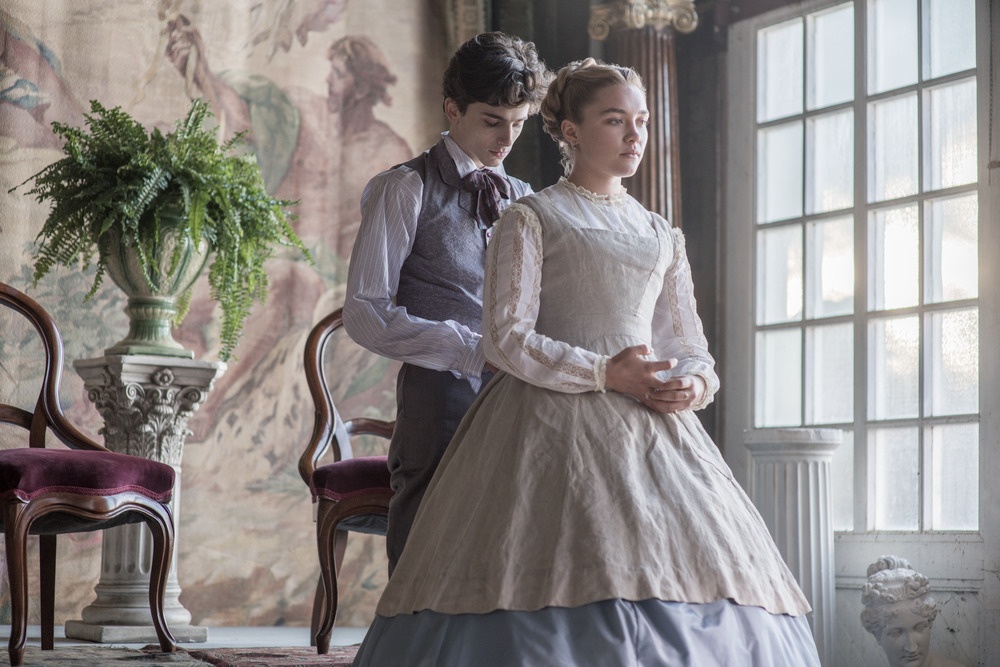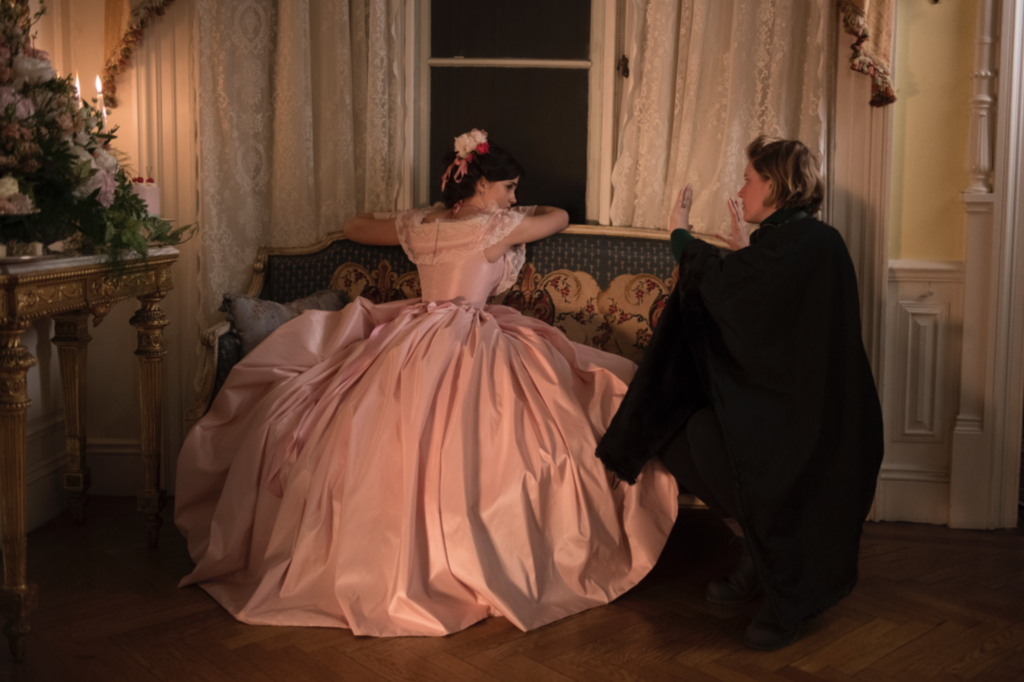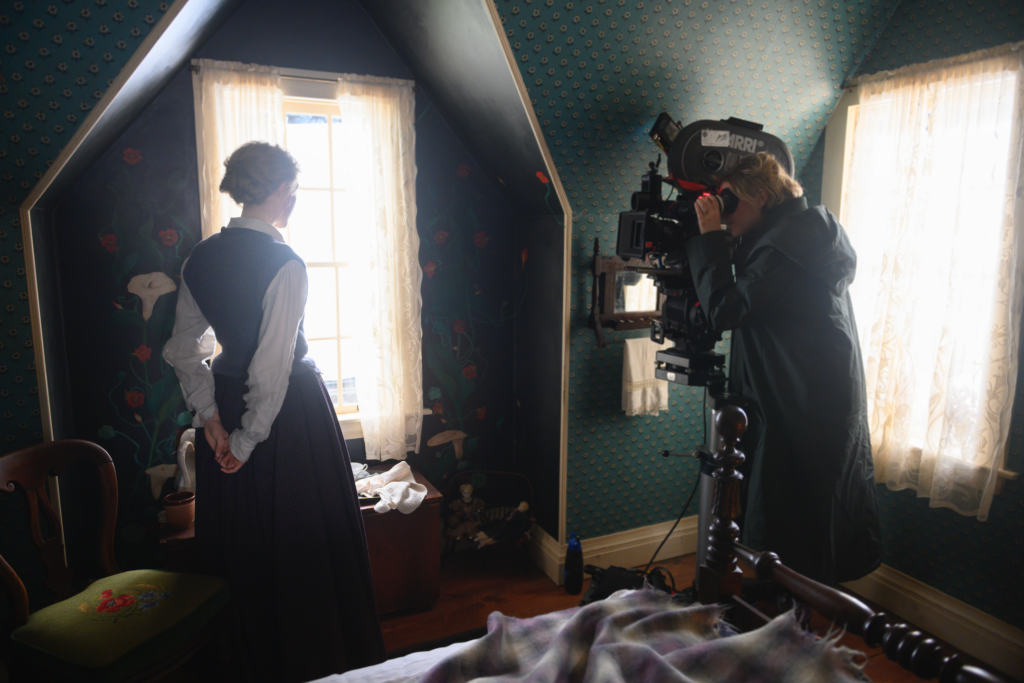It’s been 25 years since Gillian Armstrong’s Little Women hit the big screen. Benefiting from a highly accomplished cast—Susan Sarandon, future A-listers Kirsten Dunst and Christian Bale, and Winona Ryder as the iconic Jo March—the film became a touchstone for a generation of women and a critical and commercial triumph, much like Louisa May Alcott’s semiautobiographical 1868 novel.
Little Women tells the story of the March sisters—Jo, a tomboy and aspiring writer; Beth, the sweet one; Meg, who dreams of the life she had before her family fell into poverty; and Amy, the “girly-girl” of the bunch—and their transition to adulthood. The road is not always a smooth one. Jo rejects the marriage proposal of her best friend, Laurie, befuddling her family and devastating generations of heart-eyed adolescent readers. One sister contracts scarlet fever. Another has her dreams of artistic greatness dashed. And, of course, there’s the small matter that all this takes place while the March family patriarch is off serving in the Civil War.
In its depiction of four young women trying to muddle through adverse circumstances to become the best versions of themselves, Little Women even today feels strikingly modern—making this a perfect time for a new adaptation, out on Christmas Day from Sony Pictures Entertainment.
In her version—Hollywood has produced six others so far—writer-director Greta Gerwig switches things up a bit, cutting back and forth between the childhood and adult periods of the March sisters’ lives. She also sought to further “merge the identities of Louisa May Alcott and Jo March,” the author’s alter ego. (Famously, Alcott didn’t want Jo to get married off at the end of Little Women but eventually succumbed to the wishes of her readers. Gerwig pokes at the fourth wall through the character of Jo’s editor, who insists that the budding writer’s memoir, also called Little Women, end with the main character getting hitched.)
Like the ’90s adaptation before it, Gerwig’s Little Women has an enviable cast. Three-time Oscar nominee Saoirse Ronan plays Jo March alongside screen sisters Emma Watson (Meg), Eliza Scanlan (Beth), and cast standout Florence Pugh (Amy), an up-and-coming star who, between Little Women, Fighting with My Family, and Midsommar, is having quite the 2019. Also on hand are Timothée Chalamet (as Laurie), Laura Dern, Chris Cooper, Bob Odenkirk, Tracy Letts, Louis Garrel, and the inimitable Meryl Streep as the March sisters’ stern, rich aunt.
SPOILERS FOLLOW.
Congratulations on the film. I’m not a huge movie crier, but I definitely got emotional at certain points with this one.
Great! Good. I’m glad.
You’re like, “I’m going to make a whole new generation of people cry when Beth dies.”
What I hope also maybe makes people cry its when Jo March holds her book [in the end]. Even though they don’t know why they’re crying. That was another goal.
That scene definitely gave me some bookbinding feelings. “I want to take up bookbinding now! This looks great.”
I know, because it’s very emotional! And you don’t know why! Because it’s her words, it’s art, [before the] age of mechanical reproduction. It’s made by her, and that feels big and special.
It’s a tangible thing that you can hold onto. “I did something. I made a mark.” And you know that it’s not just Jo, but Louisa May Alcott as well.
Yes, that’s right. I wanted to merge the identities of Louisa May Alcott and Jo March by the end of the film. And I wanted that moment of holding the book to feel like the thing you didn’t know that you needed to see. Truly, I wanted it to feel when she gets her book at the end, the way I think you’re used to feeling when the hero and the heroine finally get together. I wanted you to feel that, but with a girl and her book.
When I was at a screening of Little Women, you were there, and you talked a bit about that—reconciling the final version of Little Women with the book Louisa May Alcott originally wanted to write. She didn’t want to marry Jo off to someone, but she felt like she had to. But the point of the character isn’t that she finds love. I feel like Louisa May Alcott would see your movie and think, “Yes ,thank you.”
A watchword for all of it was, “What would Louisa May Alcott do? What would Louisa May Alcott like?” I felt as if I was communicating with her somehow across time and space. And that ending was what I think she would have wanted. She said Jo should be a literary spinster. It was a different time. It was different audience. It was different requirements. And she didn’t do it. But I think now you can. And that feels like some version of progress.
Justice for Louisa May Alcott.
Yes, it is. But also, I’m grateful that she made a savvy decision in 1868 when she chose to marry Jo off. Because otherwise, maybe we wouldn’t have this book, and maybe it wouldn’t mean what it means to us. I never wanted to undercut the decisions she had to make or say that they weren’t the right things to do.
I assume you were a fan of the book growing up?
I loved Little Women growing up. And in particular I loved Jo March. Because Jo March was ambitious and funny and boyish and wanted to be a writer and wanted to be a boy and wanted to get out there and see the world. She was larger than life. She says at one point during the book, she thinks she wants to be a writer, but she doesn’t know. Writing, acting—she wants to do something big. She says, “I mean to astonish you all.” And Jo March-slash-Louisa May Alcott does. That character is so close to me that it felt like my memories and my sisters.

Did you see Jo differently when you were kid reading the book, versus how you felt when you revisited Little Women as a filmmaker?
That’s what’s so interesting. When I read the book as an adult, I hadn’t read it for years and years and years. I read it and reread it and reread it when I was young, but then I hadn’t looked at it for a long time. And rereading it as an adult—first of all, so many things jumped out at me as being completely modern and exciting. Things like Marmee [the March sisters’ mother, played by Laura Dern] saying, “I’m angry almost every single day of my life.” Or Amy saying, “I want to be great or nothing.” Those things are amazing to me, that they were lines of dialogue from the book. I felt like I’d never read them before.
The other thing about it was that I immediately was so intrigued by them as adults, because I think that so much of our collective memory of what that book is, is who they are in their teenage years, their childhood. I found the chapters when they were adults to be incredibly moving and interesting. It’s Jo in New York trying to be a writer and Beth living in her childhood home alone, facing death. It’s Meg with two children living on not enough money with a man she loves, but there’s a lot of isolation. And it’s Amy in Europe trying to be a painter and figuring out that she might not be a genius. All of those things were fascinating to me. I knew that I wanted to start the film with the second half of the book, which is when they’re all in these separate lives. The thing that they are yearning for, that they are nostalgic for, is childhood. It exists in a snow globe of memory. It’s this thing that the audience is also yearning for and aching for. And it’s that ache of the fact that it’s gone.
Something that’s incredibly moving to me is that once Amy goes to Europe, the four girls are never again together. Whatever that was that those four girls had together, it will never happen again. And that, to me, was so heartbreaking. And to start from the place of being separate and then, through this time travel that you are able to do in film, to bring them together again—that was the thing I wanted to do, because it struck me so much in rereading the book.

It really did work for me, the cross-cutting between the adult and childhood time periods. Because reading the book, the first impression of these characters is when they’re girls, so when they become adults … it’s not that their problems are less serious, but part of you takes them less seriously because in your mind, they’re still children.
I think when you read it as an adult, and you read that second half, all of a sudden it hits you very differently than it does when you’re young.
It’s interesting, because there’s a narrator to the book. It’s Louisa May Alcott. Jo March is not narrating the book. The presence of the narrator is stronger in the second half. Her speaking through the book is stronger. There’s this beautiful passage that makes me cry every single time I read it. It’s right before the scene where Jo tells Marmee, “Maybe I should have said yes to Laurie.” She’s lonely. There’s this passage where Louisa, the narrator, goes on a digression where she’s talking about Jo and Jo being alone. She says: Women who are five and twenty joke about being spinsters, potentially because they know they’ve still got a shot. But once they become 30, they stop talking about it, because they know what’s happening.
And then she has this whole thing of, you have to be kind to spinsters. You don’t know what romances and dramas beat under their somber gowns. Basically, “You don’t know what happened. Just be nice.” And then she addresses men directly and says, “The only chivalry worth having treats the sober spinsters kindly.” The way that I heard Louisa May Alcott speaking through these pages in the adult section of the books broke my heart. Because you know that’s who she is! She’s gone to the Civil War [as a nurse]. She’s gotten typhoid fever. She was cured with mercury and got very ill both from the fever and from the cure. She was broken. She lost all her hair. She was not able to run anymore, which is what she loved doing. She’s 36, and she’s writing Little Women. She knows she’s not going get married and have children. But she’s going to write these books. And I found it so moving to think about her. I heard the sadness, but I also heard the spikiness, and I heard the anger, and I heard the messiness of being an ambitious woman come through in a way that I just didn’t when I was 14.
There are so many things that I didn’t pick up on as a kid. Reading the book originally, I felt—as a lot of kids felt—that Jo and Laurie should have gotten married, instead of Laurie and Amy. I didn’t get Amy.
I love Amy so much. And I also think Amy and Laurie should be together. I think that’s the correct pairing. That’s why I have [Jo’s editor] Dashwood say, “Frankly, I don’t know why she didn’t marry the neighbor,” because that’s the way everybody felt!
I think that Laurie and Amy are perfectly matched. And the other thing I think is Amy has always been given short shrift. All these [parts of her personality that are] in the book didn’t coalesce into our collective memory of who Amy was. I’ve mentioned her artistic ambitions and her I-want-to-be-great-or-nothing bravado, which is fabulous. And then her clear-eyed way of looking at the world. She sees how it is. She’s just as ambitious as Jo, but she’s got to figure out how she’s going to make this work. And I think there’s something about her ability to talk with almost a clinical clarity about her position. It’s so fascinating.
In the book, she has two lines that I love that I didn’t manage to put in the screenplay. One is, “I don’t pretend to be wise, but I am observant.” And you think, holy shit, that girl sees everything. And the second one is, “The world is hard on ambitious girls.” And you think, she knows! She’s the same as Jo! She’s a worthy adversary and she’s a worthy partner. I felt that with Florence Pugh, who is so extraordinary. I knew I wanted her to play Amy. I wanted an actor who could punch the same weight class as Saoirse, which is hard because Saoirse is extraordinary.
There are all kinds of interesting things written about Jo and Laurie. One thing is, Jo is a girl with a boy’s name, and Laurie is a boy with a girl’s name, and that plays with gender inversion. Throughout the entire film I have them switch costumes. I have them wear each other’s clothes. I wanted to draw out this androgynous aspect of their relationship, because I think they really are each other’s twins in a way. And the thing that happens when Laurie asks Jo to marry him is Laurie rejecting the androgyny of childhood. And Jo’s not ready to leave it yet. He’s saying, “No, I would like you to be the woman to my man, the wife to my husband.” And Jo’s saying, “Can’t we just stay down here where we don’t have to make any of those decisions?” She doesn’t want to. And Amy’s ready to. And Amy wants to. And Amy loves him.

All four of these women have something they want to achieve, and they feel this anxiety about which road they should take to get there. If you’re a woman, and you’re not rich, your options are limited. And that’s still so true.
Yes. I was always looking at the thing was that the opposite. Jo is headstrong and knows what she wants. I always wanted to find the opposite of that. What if she wondered if it was all a mistake? And what if she’s lonely? What if that’s the price? What if that’s the other side of it? And with Amy, you think “She’s frivolous, she’s money-crazy.” But what if she wanted to be a great artist, and what if it was a painful revelation for her when she realized she wasn’t? And with Meg, what if Meg has a spending problem? Because she does! She’s spending money that she doesn’t have and not telling her husband about it. And what if Beth was never marked for death? What if she’s not happy about going? What if she had as big of a dream as anyone else? Which is what I wanted to show in that scene where she plays that beautiful sonata at the Laurences’ house on the piano. What she was doing was not a childish clunking out of hymns on the piano. It was bigger that that, because they were all ambitious. She could have been just like the rest of them.
That was the first scene where I cried, by the way.
We specifically wanted to pick pieces that were serious. We picked Bach and we picked Schumann. Because they felt like they belonged to a seriousness that we wanted to give to Beth.
You and Saoirse and Timothée Chalamet had already worked together on Lady Bird. For the entire cast, though, did you do anything to help them achieve that intimacy that the March family and their various hangers-on have?
We were very lucky that we were able to get two full weeks of rehearsal. It’s always the first thing to go. No one ever believes me that we did that much rehearsal. But I did, because I knew that I really had a specific way that I wanted the scenes to be played. In particular with the four sisters, I wanted them to feel like one organism. That they were a four-headed beast. The way I wrote the dialogue was very specific—overlaps and people cutting each other off at very specific points. And it took time to get all of that up to speed and to get it into their muscle memory so they could run the scene very fast and all be in sync with each other.
For Timothée, I wanted him to experience what Laurie experiences, which is wanting to be part of all these girls! And he did, which was wonderful, because they really took him in and made him part of their group. He has a sister. He understands that. Part of why I wanted to cast him is that I would see him during awards stuff a couple years ago, and he would bring his sister to a lot of things. And I loved seeing them together. They’re so sweet. His sister’s lovely. I saw the relationship between him and his sister, and I thought, that’s what it is! That’s Laurie!”
The physicality between the four sisters is so present. They really lean into each other.
They’re always hitting each other or hugging or pinching or grabbing. I didn’t want any of us to be polite. Any time you’re around four sisters, it’s loud.
The post “Great Or Nothing”: Greta Gerwig Marches Forth with <em>Little Women</eM> appeared first on Boxoffice.
from Boxoffice





0 comments:
Post a Comment